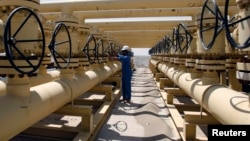WASHINGTON —
An agreement between the United States and Iraq to boost trade and investment ties is expected go into force later this year, eight years after it was negotiated, the U.S. Trade Representative's office said on Wednesday.
U.S. companies in the energy, defense, information technology, automotive and transportation sectors in recent years have become increasingly active in Iraq, which the United States invaded 10 years ago this month.
The United States and Iraq negotiated a Trade and Investment Framework Agreement (TIFA) in 2005 to create a government-to-government forum to discuss how increase trade and investment flows between the two countries.
The Iraqi parliament finally ratified the TIFA text in December, and the two sides firmed up plans to proceed with the forum in meetings this week in Baghdad.
"After an exchange of diplomatic notes brings the TIFA into force later this year, the first meeting of the Joint Council for bilateral consultations on trade and investment issues can take place in 2014," USTR said.
Two-way trade between the United States and Iraq in 2012 was $21.3 billion, with U.S. exports to Iraq at $2.04 billion, and Iraqi exports to the United States at $19.3 billion, most of that oil.
Last week, the United States and Afghanistan held their seventh TIFA meeting since 2004 to discuss a number of initiatives, including the war-torn country's hopes of joining the World Trade Organization by the end of 2014.
In another move aimed at building U.S. trade ties with the Muslim world, U.S. Trade Representative Ron Kirk announced on Sunday plans that should allow more Egyptian companies to qualify for duty-free treatment on exports to the United States as long as they use inputs from Israel.
Kirk said he planned to liberalize the designation of existing "Qualifying Industrial Zones" in Egypt to make all production facilities, present and future, in the zones potentially eligible for duty-free treatment.
"Egypt's and Israel's desire to add new features to their joint QIZ program underscores the success of the program in fostering closer ties between the people, businesses and governments of these two countries," Kirk said.
U.S. companies in the energy, defense, information technology, automotive and transportation sectors in recent years have become increasingly active in Iraq, which the United States invaded 10 years ago this month.
The United States and Iraq negotiated a Trade and Investment Framework Agreement (TIFA) in 2005 to create a government-to-government forum to discuss how increase trade and investment flows between the two countries.
The Iraqi parliament finally ratified the TIFA text in December, and the two sides firmed up plans to proceed with the forum in meetings this week in Baghdad.
"After an exchange of diplomatic notes brings the TIFA into force later this year, the first meeting of the Joint Council for bilateral consultations on trade and investment issues can take place in 2014," USTR said.
Two-way trade between the United States and Iraq in 2012 was $21.3 billion, with U.S. exports to Iraq at $2.04 billion, and Iraqi exports to the United States at $19.3 billion, most of that oil.
Last week, the United States and Afghanistan held their seventh TIFA meeting since 2004 to discuss a number of initiatives, including the war-torn country's hopes of joining the World Trade Organization by the end of 2014.
In another move aimed at building U.S. trade ties with the Muslim world, U.S. Trade Representative Ron Kirk announced on Sunday plans that should allow more Egyptian companies to qualify for duty-free treatment on exports to the United States as long as they use inputs from Israel.
Kirk said he planned to liberalize the designation of existing "Qualifying Industrial Zones" in Egypt to make all production facilities, present and future, in the zones potentially eligible for duty-free treatment.
"Egypt's and Israel's desire to add new features to their joint QIZ program underscores the success of the program in fostering closer ties between the people, businesses and governments of these two countries," Kirk said.






